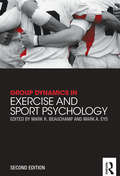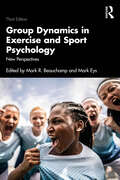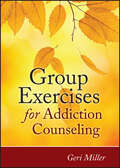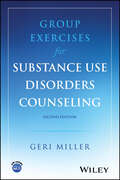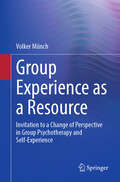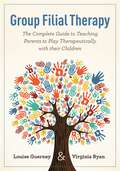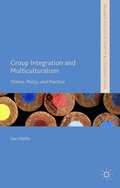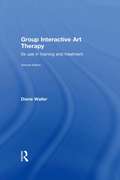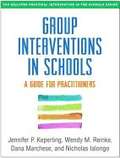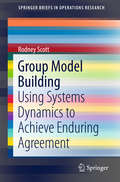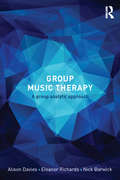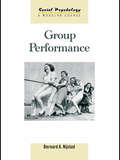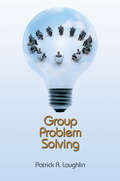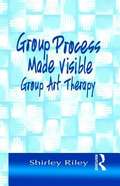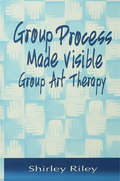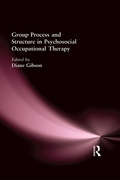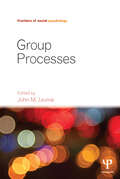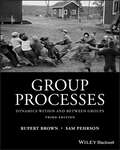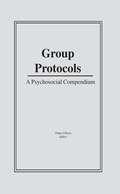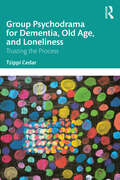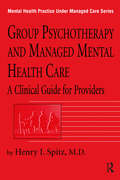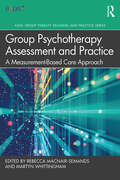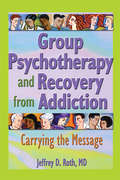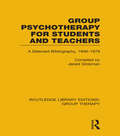- Table View
- List View
Group Dynamics in Exercise and Sport Psychology: Contemporary Themes
by Mark R. Beauchamp Mark A. EysCan a better understanding of group dynamics raise individual and team athletic performance or improve the outcomes of exercise interventions? Much human behaviour in sport and exercise settings is embedded within groups, where individuals’ cognitions, emotions, and behaviours influence and are influenced by other group members. Now in a fully revised, updated, and expanded second edition, Group Dynamics in Exercise and Sport Psychology explores the unique psychological dynamics that emerge in sport and exercise groups. It provides a clear and thorough guide to contemporary theory, research, and applied practice, covering core themes and cutting-edge topics as well as highlighting directions for future research. The book is organised into five thematic sections: Part 1: The Self in Groups Part 2: Leadership in Groups Part 3: Group Environment Part 4: Motivation in Groups Part 5: Socio-Environmental Issues in Groups This new edition includes seven completely new chapters, exploring important emerging issues such as social identity, the family, co-ordination and shared knowledge within sport teams, the group as a vehicle for facilitating individual behavior change, social support and emotion regulation, peer leadership, and cultural perspectives in relation to group dynamics. No other book on group dynamics in sport or exercise offers such a close examination of the evidence base, and therefore Group Dynamics in Exercise and Sport Psychology is important reading for all students, researchers, or practitioners working in sport or exercise psychology, kinesiology, sport and exercise science, sports coaching, or physical education.
Group Dynamics in Exercise and Sport Psychology: New Perspectives
by Mark R. Beauchamp Mark EysThe third edition of Group Dynamics in Exercise and Sport Psychology: New Perspectives explores the unique psychological dynamics that emerge in sport and exercise groups. It provides a clear and thorough guide to contemporary theory, research, and applied practice, covering core themes and cutting-edge topics as well as highlighting directions for future research.Much human behavior in sport and exercise settings is embedded within groups, where individuals’ cognitions, emotions, and behaviors influence and are influenced by other group members. Now in a fully revised and updated third edition, Group Dynamics in Exercise and Sport Psychology: New Perspectives sheds new light on the psychology of groups in exercise and sport settings, providing an entirely new set of perspectives on the theory and research applied to groups in exercise and sport settings. No other book on group dynamics in sport or exercise offers such a close examination of the evidence base, and therefore Group Dynamics in Exercise and Sport Psychology: New Perspectives is important reading for all students, researchers, or practitioners working in sport or exercise psychology, kinesiology, sport and exercise science, sports coaching, or physical education.
Group Exercises for Addiction Counseling
by Geri MillerAn indispensable collection of ready-to-use, proven exercisesProviding immediately useful group counseling suggestions and tips for addictions counselors, Group Exercises for Addiction Counseling offers powerful techniques that can be adapted to any clinical practice.Written in the author's gentle yet purposeful voice, this reader-friendly resource is filled with guidance for developing an addictions counseling group; handling Stage 2 confrontations of the leader; and building group member awareness. In addition, the author helps counselors enhance client awareness of addiction-related stressors and how to cope with those stressors.Group Exercises for Addiction Counseling contains valuable information on:Addiction recoveryFamily, relationships, and cultureFeelings explorationGroup community buildingRecovery skillsValuesOpening and closing each group sessionFostering care, respect, and honesty in the group counseling setting, the techniques found in Group Exercises for Addiction Counseling allow counselors to help their clients break out of dysfunctional interaction patterns and live better lives.
Group Exercises for Substance Use Disorders Counseling
by Geri MillerAn expertly curated collection of effective group exercises for patients with addictions In the newly revised second edition of Group Exercises for Substance Use Disorders Counseling, experienced addiction counselor, Geri Miller, delivers a practical collection of group therapy exercises for patients struggling with substance addictions. The author has drawn on over four decades of frontline experience treating addicted patients, as well as the latest research, evidence, and best practices, to curate a selection of group exercises that improve health outcomes among a wide variety of patient populations. You#ll find useful group exercises accompanied by easy-to-understand instructions in an intuitively organized format. These exercises assist patients in the development of self-awareness of harmful behaviors and patterns and realistic strategies they can apply immediately to help address them. They also help patients identify stressors and triggers and offer techniques to avoid or resist them. Inside the book: Practical group counseling exercises that work with patients from myriad backgrounds, including those belonging to especially vulnerable groups Easy-to-follow instructions for clinical practitioners, counselors, social workers, and other professionals conducting group therapy for addiction Complimentary PowerPoint resources to help educators in a classroom setting, as well as counselor supervisors conducting training An essential and updated resource for mental health and addiction counselors, Group Exercises for Substance Use Disorders Counseling is an invaluable book for anyone involved in or studying substance abuse counseling and treatment.
Group Experience as a Resource: Invitation to a Change of Perspective in Group Psychotherapy and Self-Experience
by Volker MünchThis textbook for psychotherapists and group therapists encourages the reader to reflect on their own group experiences throughout their life journey and to relate these insights to therapy processes. Psychological life and personal development always occur within networks. Analytical group therapy utilizes this and makes psychological processes visible that often remain unclear in individual treatments. Our understanding of human psychological development is transforming in light of neuroscientific findings and against the backdrop of the complex societal challenges of our time, evolving into a view of humans as social animals. We are witnessing a resurgence in group therapy and an openness to theories that emphasize our mutual dependence in a positive sense. Togetherness and solidarity can thus be practiced collectively, unleashing transformative power for change in individuals, but also for society. Many relatable examples, especially from therapeutic groups, illustrate this. Written for: Psychotherapists, group therapists, group leaders in the medical and social fields. About the Author: Dipl. Psych. Volker Münch, Psychological Psychotherapist in private practice in Munich. Teaching analyst, supervisor, and lecturer at MAP, Munich. Publications on topics such as therapeutic attitude, digitalization, and midlife crisis.
Group Filial Therapy: The Complete Guide to Teaching Parents to Play Therapeutically with their Children
by Virginia Ryan Louise GuerneyIn Group Filial Therapy (GFT), therapists train parents to conduct play sessions with their own children to help meet children's therapeutic needs, and to transfer appropriate skills to family life. Based on parents' application of Child-Centred Play Therapy, taught and supervised by filial therapists, this evidence-based method is highly effective for working with families from diverse backgrounds and locations. This book provides an accessible guide to the theory and practice of GFT, and for the first time offers step-by-step guidelines for implementing the GFT program developed by Dr Guerney, the co-creator of Filial Therapy. Important practical considerations are addressed by Dr Guerney and Dr Ryan, such as how to determine the composition of groups and the duration of programs, and how to conduct Filial Therapy intakes. The facilitative attitudes and skills needed to be an effective Filial Therapy group leader are also described, and comprehensive instructions for implementing Dr Guerney's 20-week model of GFT are provided. The book closes with examples of how the program may be adapted to meet the needs of special groups. Replete with examples and dialogues bringing to life the group process, this definitive guide will enable therapists already familiar with the method, as well as those wishing to learn it, to maximise the fulfilment of therapeutic goals for participating families. Practitioners in mental health, social services and counselling, as well as parenting experts, play and filial therapists and therapists in training will find that this book expands and enriches the services they can offer their clients.
Group Integration and Multiculturalism
by Dan PfefferWith immigration fulfilling the role of population maintenance and growth in many Western democracies, how should these countries incorporate newcomers? This book argues that states ought to promote group integration for communities that have settled through immigration. Pfeffer defines group integration as the process through which communities develop lobbies and institutions that represent the group's perspective, and help it to enter into dialogue with their receiving society. With examples from throughout Europe and North America, the justice-based argument suggests that states should facilitate group integration since it improves, among other things, the democratic participation of groups.
Group Interactive Art Therapy: Its use in training and treatment
by Diane WallerThe first edition of Group Interactive Art Therapy presented the first theoretical formation of a model integrating the change-enhancing factors of both interactive group psychotherapy and art therapy, demonstrating its use in practice through a series of illustrated case examples. This long-awaited second edition updates the content of the original in light of the major social, cultural and political changes of the past two decades and presents new examples of the model in practice. The new edition includes a brand-new section on the use of group interactive art therapy in research with people with dementia, with schizophrenia, and those in rehabilitation from a stroke. The book also features two chapters on the use of the model in a broader context. The book is presented in four parts: Introducing group interactive art therapy The model in practice: case examples The wider context Group interactive art therapy used in research Each section demonstrates the flexibility and adaptability of the model in different cultural and social settings and with a variety of client groups. The development of knowledge about the skills required for conducting an interactive art therapy group and its suitability for different clients has been incorporated throughout the book, as well as practical information on working in areas where there is limited access to art materials.
Group Interventions in Schools: A Guide for Practitioners
by Dana Marchese Jennifer P. Keperling Nicholas Ialongo Wendy M. ReinkeNumerous group interventions have been shown to be effective for helping K-8 students who are struggling with--or at risk for--a wide range of mental health and behavior problems. This unique book gives school practitioners indispensable tools for making any evidence-based group intervention more successful. It addresses the real-world implementation challenges that many manuals overlook, such as how to engage children and parents and sustain their participation, manage behavior in groups, and troubleshoot crisis situations. User-friendly features include case examples, reflection questions, role-play scenarios, and 31 reproducible forms and handouts; the print book has a large-size format with lay-flat binding for easy photocopying. Purchasers get access to a Web page where they can download and print the reproducible materials. This book is in The Guilford Practical Intervention in the Schools Series.
Group Model Building: Using Systems Dynamics to Achieve Enduring Agreement (SpringerBriefs in Operations Research)
by Rodney ScottThis book describes the cognitive and interpersonal effects of group model building, and presents empirical research on what group model building achieves and how. Further, it proposes an integrated causal mechanism for the effects on participants. There have been multiple previous attempts at explaining the effects of group model building on participants, and this book integrates these various theories for the first time.The causal mechanisms described here suggest a variety of design elements that should be included in group model building practice. For example, practitioners typically try to reduce complexity for clients, to make the process feel more accessible. In contrast, the findings presented here suggest that the very act of muddling through complexity increases participants’ affective commitment to the group and the decisions made.The book also describes implications for theory and practice. System dynamics has traditionally been interested in using technical modeling processes to make policy recommendations. Group model building demonstrates that these same techniques also have implications for group decision making as a method for negotiating agreement. The book argues for the value of group model building as a mediating or negotiating tool, rather than merely a positivist tool for technical problems.
Group Music Therapy: A group analytic approach
by Alison Davies Eleanor Richards Nick BarwickIn Group Music Therapy Alison Davies, Eleanor Richards and Nick Barwick bring together developments in theory and clinical practice in music therapy group work, celebrating the richness of what group analytic thinking and music therapy can offer one another. The book explores the dynamic elements of the processes that take place in both group analytic therapy and group music therapy, exploring both the commonalities and the distinctive characteristics of the two modalities. To music therapists, psychotherapists and other arts therapists Group Music Therapy offers a body of knowledge and enquiry through which to understand the music therapy group process through some of the central proposals of group analysis; to group analysts it offers insight into the possibilities of non-verbal communication through improvised music and, more widely, invites thought in musical terms about the nature of events and exchanges in a therapy group. Links are made with group analytic theory as well as with other associated theoretical traditions, such as attachment theory and theories of early infant development. The book explores the history of group music therapy and the history of group analysis, looking both at core concepts and at more recent developments. Attention is also given to developmental issues, drawing upon theories of infant development and attachment theory and clinical vignettes drawn from music therapy practice with a wide range of patient groups illustrates these ideas. The book concludes with a discussion of the possibilities of co-therapy and other collaborative working and of the value of experiential groups in training. Group Music Therapy will be a key text for clinicians and students seeking to expand their theoretical thinking and enrich their practice, and offers a grounding in group analytic ideas to professionals in other disciplines considering referrals to group work.
Group Performance
by Bernard A. NijstadPeople interact and perform in group settings in all areas of life. Organizations and businesses are increasingly structuring work around groups and teams. Every day, we work in groups such as families, friendship groups, societies and sports teams, to make decisions and plans, solve problems, perform physical tasks, generate creative ideas, and more. Group Performance outlines the current state of social psychological theories and findings concerning the performance of groups. It explores the basic theories surrounding group interaction and development and investigates how groups affect their members. Bernard A. Nijstad discusses these issues in relation to the many different tasks that groups may perform, including physical tasks, idea generation and brainstorming, decision-making, problem-solving, and making judgments and estimates. Finally, the book closes with an in-depth discussion of teamwork and the context in which groups interact and perform. Offering an integrated approach, with particular emphasis on the interplay between group members, the group task, interaction processes and context, this book provides a state-of-the-art overview of social psychological theory and research. It will be highly valuable to undergraduates, graduates and researchers in social psychology, organizational behavior and business.
Group Play Therapy: A Dynamic Approach
by Daniel S. Sweeney Jennifer Baggerly Dee C. RayGroup Play Therapy presents an updated look at an effective yet underutilized therapeutic intervention. More than just an approach to treating children, group play therapy is a life-span approach, undergirded by solid theory and, in this volume, taking wings through exciting techniques. Drawing on their experiences as clinicians and educators, the authors weave theory and technique together to create a valuable resource for both mental health practitioners and advanced students. Therapists and ultimately their clients will benefit from enhancing their understanding of group play therapy.
Group Problem Solving
by Patrick R. LaughlinExperimental research by social and cognitive psychologists has established that cooperative groups solve a wide range of problems better than individuals. Cooperative problem solving groups of scientific researchers, auditors, financial analysts, air crash investigators, and forensic art experts are increasingly important in our complex and interdependent society. This comprehensive textbook--the first of its kind in decades--presents important theories and experimental research about group problem solving. The book focuses on tasks that have demonstrably correct solutions within mathematical, logical, scientific, or verbal systems, including algebra problems, analogies, vocabulary, and logical reasoning problems. The book explores basic concepts in group problem solving, social combination models, group memory, group ability and world knowledge tasks, rule induction problems, letters-to-numbers problems, evidence for positive group-to-individual transfer, and social choice theory. The conclusion proposes ten generalizations that are supported by the theory and research on group problem solving. Group Problem Solving is an essential resource for decision-making research in social and cognitive psychology, but also extremely relevant to multidisciplinary and multicultural problem-solving teams in organizational behavior, business administration, management, and behavioral economics.
Group Process Made Visible: The Use of Art in Group Therapy
by Shirley RileyGroup Process Made Visible demonstrates the usefulness of the language of art in enabling group therapists and their clients to understand group members' perceptions of constructs and realities. Externalizing difficulties in visible form clarifies the patient's intended communication and provides the opportunity for constructive conversation. In this book, Shirley Riley explains nonartistic persons' accessibility to expressive tasks that reinforce the development of group cohesion and accelerate the establishment of a trusting and involved group. The book introduces the reader to the approach and general philosophy of the use of art as an additional language in group therapy. Through the presentation of a series of illustrations, the author exhibits the visual medium's usefulness in treating patients who suffer from a broad range of disorders or who have experienced various types of trauma. The basis of Shirley Riley's writing lies in the personal and professional experiences explored in the case examples provided in Group Process Made Visible. Through the material offered in this book, she clearly defines structure, rationale, and dynamics. The readable, informative format of the work provides therapists with access to a creative addition to verbal therapy. This addition is not only effective, but it provides a command of communication that is appealing to clients. There are no recipes for interpretation or laundry lists of activities. Rather, the approach encourages a cooperative focus that leans toward a contemporary theory befitting in today's mental health world.
Group Process Made Visible: The Use of Art in Group Therapy
by Shirley RileyThis book introduces the reader to the approach and general philosophy of the use of art as an additional language in group therapy. It demonstrates the usefulness of the language of art in enabling group therapists and their clients to understand group members' perceptions of constructs and realities.
Group Process and Structure in Psychosocial Occupational Therapy
by Diane GibsonEffective group leadership techniques are the focus of this practical, sound volume. Dedicated to assisting occupational therapy practitioners and students in understanding current theory and state-of-the-art techniques in group treatment, this functional book fills the gap left by existing literature and educational programs that focus mainly on diagnoses and task analysis. Highly skilled professionals examine the important concepts of group therapy--structural elements, such as goals, norms, group size, physical environment, and instructions that can be varied depending on the purpose, needs, and functional level of the client; the ability to guide and control process elements, such as spontaneous feedback; and the ability to support clients and help build a cohesive, safe group. Fascinating examples of innovative new group techniques--social skills game, mime group, and the use of robots--demonstrate how creative content can effectively combine structure and process in group treatment.
Group Processes (Frontiers of Social Psychology)
by John M. LevineIt is impossible to understand human behavior without understanding the critical role that groups play in people’s lives. Most of us belong to a range of formal and informal groups, including families, work teams, and friendship cliques. These groups absorb a great deal of our time and energy and are instrumental in satisfying our most fundamental needs. In addition, they connect us to larger social aggregates (e.g., political parties, business organizations, religious denominations) that influence our lives in important ways. This volume provides a comprehensive overview of classic and contemporary issues in the field of group processes. Chapters are written by internationally known experts who have made major theoretical and empirical contributions to the study of groups. The broad and up-to-date coverage of the book makes it an essential resource for advanced undergraduates, graduate students, researchers, and practitioners. The volume will be of interest to scholars in various disciplines, including social and organizational psychology, sociology, communication, economics, and political science.
Group Processes: Dynamics within and Between Groups
by Rupert Brown Samuel PehrsonThe new edition of the classic text on group dynamics theory and research—extensively revised, expanded, and updated Offering a critical appraisal of theory and research on groups, Group Processes: Dynamics with and Between Groups is one of the most respected texts in the field. This comprehensive volume covers all the essential dynamics of group processes and intergroup relations, ranging from group formation, norms, social influence and leadership to group aggression, prejudice, solidarity, intergroup contact and collective action. Contemporary examples and plentiful charts, graphs, and illustrations complement discussions of the latest themes and current controversies in group psychology. Now in its third edition, this book has been thoroughly revised with a significant amount of new and updated content. New topics include the contribution of groups to health and wellbeing, group-based emotions, hierarchy and oppression, intergroup helping and solidarity, acculturation and reconciliation. Sections on social influence, crowd behavior, leadership, prejudice, collective action and intergroup contact have been comprehensively revised and updated to reflect two decades of development in these fields. Three inter-linked themes—social identity, social context, and social action—illustrate the influence of groups on self and self-worth, the meaning and consequences of membership in groups, and how groups can be vehicles for members to achieve change in their environments. A key text in the field for over thirty years, Group Processes: Offers broad, balanced coverage of group processes, including in-depth examination of intergroup relations Incorporates theoretical themes inspired by the social identity perspective Includes topical examples drawn from the world of politics, popular culture, and sports Provides up-to-date content on major new developments in the field Integrates modern theory, current research, and classic sources Group Processes: Dynamics with and Between Groups, 3rd Edition is ideal for core reading in undergraduate and postgraduate courses in social psychology, particularly in modules dedicated to group processes and intergroup relations.
Group Protocols: A Psychosocial Compendium
by Diane GibsonHere is a valuable book intended to help those occupational therapists working in mental health settings to refine their critical thinking about the group activities they select and the protocols they design. Experts focus on practicing sound clinical reasoning and clinical decision making to ensure careful assessment of which activities, structured in what fashion, are appropriate for particular populations. They also address the topic of providing services that are relevant, practical, have already delineated goals and objectives, produce outcome data, and can be replicated across settings. Group Protocols: A Psychosocial Compendium offers readers a systematic approach to the assessment and design of group protocols, plus a wide variety of sample protocols from which treatment strategies may be drawn. Because this volume represents a style of thinking rather than a singular theoretical frame of reference, it will be useful to any occupational therapist for whom groups are an essential aspect of professional practice.
Group Psychodrama for Dementia, Old Age, and Loneliness: Trusting the Process
by Tzippi CedarGroup Psychodrama for Dementia, Old Age, and Loneliness offers a fresh approach for professionals working with older individuals by employing new and exciting custom methodologies in psychodrama, particularly for clients with Alzheimer’s disease or other forms of dementia. This book offers a general explanation of the use of psychodrama by giving an overview of the therapeutic use of drama in all its forms, clearly explaining the concepts and methods, and describing the rationale of every intervention while also following a group over six years with precious documentation of the group process. It addresses the main concerns of those who suffer from dementia – adjusting to a new and changing level of functioning, fostering a sense of belonging, preserving their innate dignity, and redefining relationships and roles. This practical guide will help therapists, social workers, family and other caregivers, teachers, and medical professionals working with older clients seeking comfort from the loneliness of old age and dementia using group psychodrama.
Group Psychotherapy And Managed Mental Health Care: A Clinical Guide For Providers
by Henry I. SpitzFirst published in 1996. Routledge is an imprint of Taylor & Francis, an informa company.
Group Psychotherapy Assessment and Practice: A Measurement-Based Care Approach (AGPA Group Therapy Training and Practice Series)
by Rebecca MacNair-Semands Martyn WhittinghamGroup Psychotherapy Assessment and Practice is the definitive guide to assessment in group therapy, offering the reader a means to understand and implement group therapy screening, process, and outcome tools. Geared to group psychotherapists as well as academics, this state-of-the-art text provides the reader with a framework to support and augment clinical judgment as part of routine clinical practice. It demonstrates how utilizing measurement-based care collaboratively with clients can help maximize therapeutic processes and mechanisms of change. This book shows how measures can improve the detection of client worsening and prevent premature dropout – two factors that contribute greatly to our duty to client care. Leading experts in the field provide examples of new measures that can enhance multicultural training and group leader cultural sensitivity, illustrating how awareness of diversity can enhance clinical practice and provide more contextually responsive treatment. Examples of cross-cultural adaptations of measurement are also included that place group therapy assessment within an international framework. This modern guide provides practical tools such as handouts, measures to aid in member selection, and methods of tracking progress and outcome to strengthen the group leader’s effectiveness.
Group Psychotherapy and Recovery from Addiction: Carrying the Message
by Jeffrey D. RothLearn what it&’s like to be a member of an addiction recovery group! Group Psychotherapy and Recovery from Addiction: Carrying the Message is NOT a self-help book. Instead, it&’s a rare opportunity to sit in on a virtual therapy group and take part in a virtual Twelve Step meeting. The book&’s unique perspective lets you compare and contrast the experience of participating in a psychotherapy group and a Twelve Step group, including an examination of the Twelve Steps and The Twelve Traditions. The book demystifies the process of recovery, demonstrating all the important elements of the group process, including free association, resistance, transference, re-enactment, boundary management, interpretation, and confrontation. Rather than relate shared stories of addicts in recovery or present abstract formulations on the group experience, Group Psychotherapy and Recovery from Addiction takes you inside the experiential process of recovery that can&’t be achieved in isolation. Your experience as a group "member" will help solve the mystery of the group process and provide you with insight into the scientific elements of recovery as the book builds a bridge between the Twelve Step programs and a psychoanalytic model of group functioning. Group Psychotherapy and Recovery from Addiction examines: how the group carries the message of recovery the higher power of the group as a symbol of authority the development of prayer and meditation as group analytic functions addiction as a family disease making amends as an export process powerlessness and free association unmanageability and resistance surrender and transference inventory and re-enactments humility and working through The Twelve Steps and The Twelve Traditions of Alcoholics Anonymous and much more! Group Psychotherapy and Recovery from Addiction: Carrying the Message is a unique resource for group therapists, addiction treatment professionals, and anyone else interested in group therapy-especially those who have personal experience with Twelve Step recovery.
Group Psychotherapy for Students and Teachers: Selected Bibliography, 1946-1979 (Routledge Library Editions: Group Therapy)
by Jerald GrobmanOriginally published in 1981, this is a carefully selected bibliography of group psychotherapy for both students and teachers. The book is divided into three useful parts containing relevant journal articles and book chapters on a variety of topics. The first part includes topics that would be useful for a seminar in basic analytic group psychotherapy. Topics in the second part include group therapy with special patient populations, group therapy in special settings, special types of group therapy and research and outcome studies in group therapy. The third part covers group therapy with children. All the articles can be used to develop specialized and specific literature seminars or to elucidate issues that arise in the clinical supervision of group psychotherapy.
